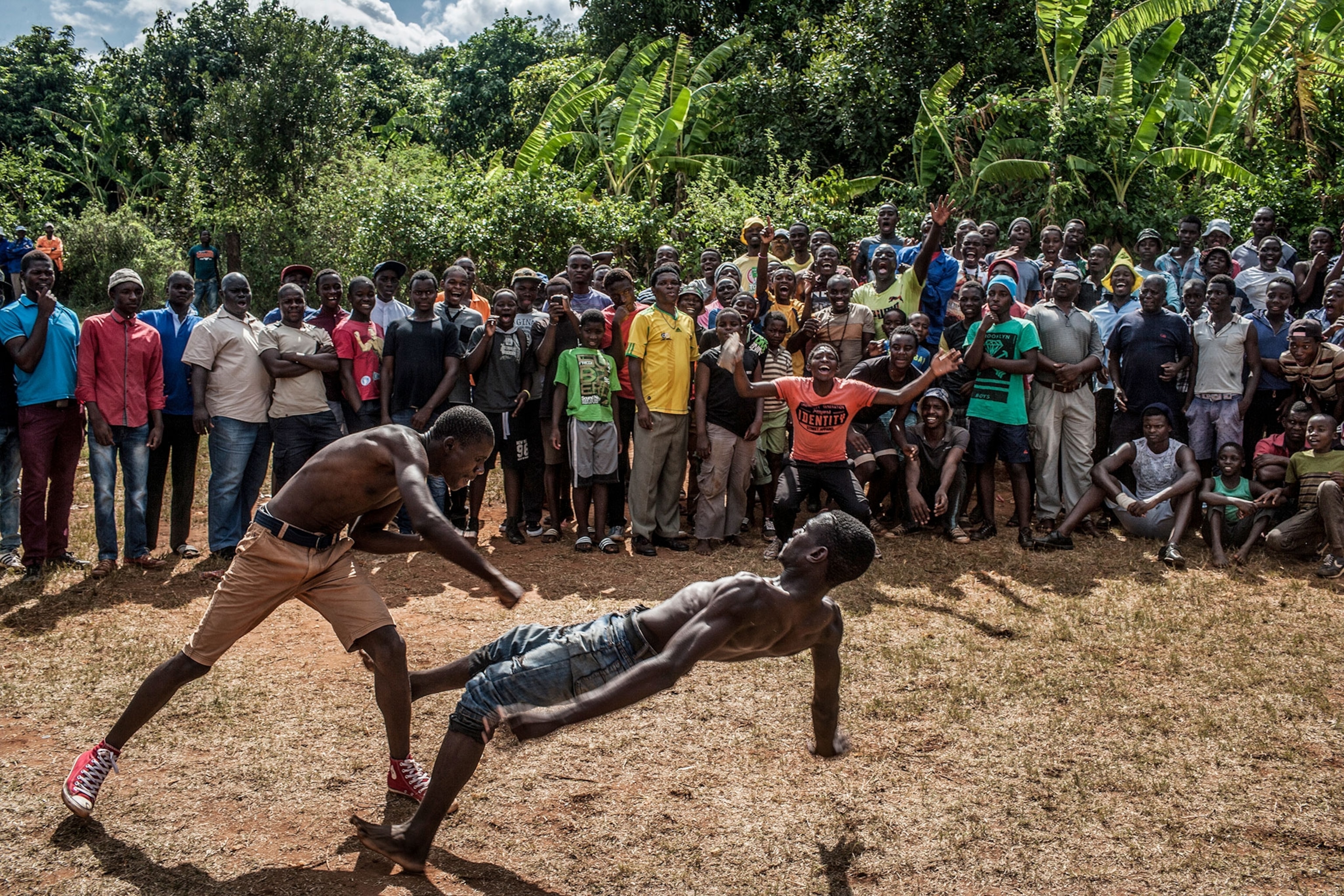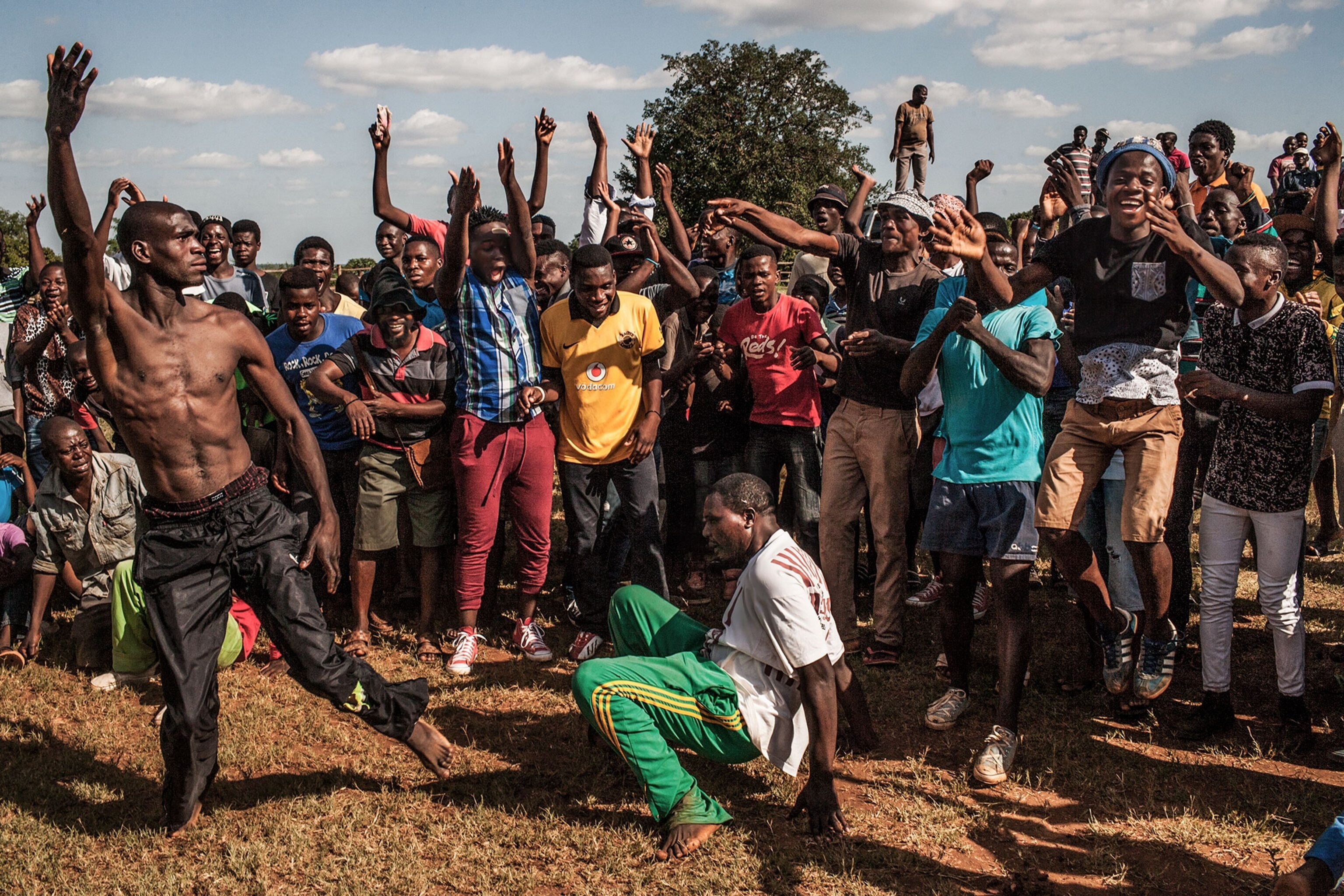
In South African Tribe, Boys Box Their Way to Manhood
A photographer explores the Venda people’s bare-knuckle boxing tradition, a rite of passage for boys as young as nine.
Below the fighting grounds, where Venda men in Tshifudi, South Africa, have long sparred and bled, boys congregate on a riverside. During seasonal rains the river flows swiftly but now in December, at the peak of summer in the Southern Hemisphere, it is but a series of puddles where the boys splash and laugh and tease each other. On the banks they find shade and lean together—arms draped over shoulders—with an intimacy that will last only the length of boyhood’s tender years. The day is long and warm and free.

As the sun reaches its apex, an older man summons them from beyond the ridgeline. Other boys have gathered on the pitch and the fights will soon begin. A nervous energy takes hold as they gather their clothes and shoes. One boy, lean and sinewy, hops on one bare foot, his head tilted, clearing water from his ear. “Now we will play musangwe,” he says with a grin as he skips past me to catch up with the others. “Today we will be strong men.”


Since the mid-19th century, men and boys of the Venda community have convened on this field to participate in a form of bare-knuckle boxing known as musangwe. “It started with the head boys who looked after cattle,” explains Tshilidzi Ndevana, a former musangwe champion and current custodian of the tradition. In Venda areas, he is known almost exclusively by his fighting name, Poison. “When they gathered cattle here to be bathed, the bulls would begin to fight and soon the fighting spilled from the bulls to the boys,” he says. A mischievous head boy might sharpen the horns of one of his bulls, Poison explains, and the owner of an injured bull would fight for retribution. Even as most of the Venda community moved away from pastoralism, musangwe has endured as a rite for both men and boys. “The sport is hard, and those who participate develop a hard heart,” Poison says. “This teaches men to endure pain and to stand up to any challenge.”

Beyond its role as a preparation for manhood, musangwe is bound to notions of identity and belonging. “When a boy plays musangwe,” Poison explains, “he feels that he belongs to the Venda people. That’s the first thing. Belonging. If you’re an African man and a Venda person. it is musangwe that differentiates you from the people of other communities.”
Under the critical gaze of peers and elders alike, the boys pace anxiously. Despite the social pressure, the scene is defined by an overriding sense of reluctance. In a bid to encourage bouts, friends cajole one another; some shove others toward potential opponents. The ones doing the shoving are, of course, hoping to avoid the fighting themselves.


I can feel the same uneasiness I felt as a kid, wary of the same painful violence. I fought often to prove my tenacity and to avoid the social ridicule that accompanied an appearance of weakness. But physical confrontation did not come naturally to me, and despite my young attempts at bravado I never once fought on steady legs. Like many of the pacing boys on the musangwe pitch, I was wracked with nerves—trembling yet determined to hide my fear from on-lookers. Each time I clenched my hands into fists, I battled as much with my own sensitivity as I did with the boy who had offended it.

After a sweltering day of fights, none terribly serious, the boys retreat into the evening’s merciful breeze to gather with neighborhood girls beneath the steep bluffs that mark Tshifudi’s northern boundary. Despite some scrapes and bruises, they sing and dance together in other games. One boy puffs out his chest and wraps his arm around a girl who glances at him demurely. The pair parades before friends, who clap and sing, all exploring a different part of fledgling adulthood.


Related Topics
You May Also Like
Go Further
Animals
- Octopuses have a lot of secrets. Can you guess 8 of them?
- Animals
- Feature
Octopuses have a lot of secrets. Can you guess 8 of them? - This biologist and her rescue dog help protect bears in the AndesThis biologist and her rescue dog help protect bears in the Andes
- An octopus invited this writer into her tank—and her secret worldAn octopus invited this writer into her tank—and her secret world
- Peace-loving bonobos are more aggressive than we thoughtPeace-loving bonobos are more aggressive than we thought
Environment
- This ancient society tried to stop El Niño—with child sacrificeThis ancient society tried to stop El Niño—with child sacrifice
- U.S. plans to clean its drinking water. What does that mean?U.S. plans to clean its drinking water. What does that mean?
- Food systems: supporting the triangle of food security, Video Story
- Paid Content
Food systems: supporting the triangle of food security - Will we ever solve the mystery of the Mima mounds?Will we ever solve the mystery of the Mima mounds?
- Are synthetic diamonds really better for the planet?Are synthetic diamonds really better for the planet?
- This year's cherry blossom peak bloom was a warning signThis year's cherry blossom peak bloom was a warning sign
History & Culture
- Strange clues in a Maya temple reveal a fiery political dramaStrange clues in a Maya temple reveal a fiery political drama
- How technology is revealing secrets in these ancient scrollsHow technology is revealing secrets in these ancient scrolls
- Pilgrimages aren’t just spiritual anymore. They’re a workout.Pilgrimages aren’t just spiritual anymore. They’re a workout.
- This ancient society tried to stop El Niño—with child sacrificeThis ancient society tried to stop El Niño—with child sacrifice
- This ancient cure was just revived in a lab. Does it work?This ancient cure was just revived in a lab. Does it work?
- See how ancient Indigenous artists left their markSee how ancient Indigenous artists left their mark
Science
- Jupiter’s volcanic moon Io has been erupting for billions of yearsJupiter’s volcanic moon Io has been erupting for billions of years
- This 80-foot-long sea monster was the killer whale of its timeThis 80-foot-long sea monster was the killer whale of its time
- Every 80 years, this star appears in the sky—and it’s almost timeEvery 80 years, this star appears in the sky—and it’s almost time
- How do you create your own ‘Blue Zone’? Here are 6 tipsHow do you create your own ‘Blue Zone’? Here are 6 tips
- Why outdoor adventure is important for women as they ageWhy outdoor adventure is important for women as they age
Travel
- This royal city lies in the shadow of Kuala LumpurThis royal city lies in the shadow of Kuala Lumpur
- This author tells the story of crypto-trading Mongolian nomadsThis author tells the story of crypto-trading Mongolian nomads
- Slow-roasted meats and fluffy dumplings in the Czech capitalSlow-roasted meats and fluffy dumplings in the Czech capital




